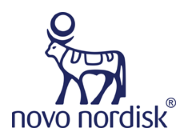The history of Novo Nordisk dates back to the time when insulin was discovered. In 1922, the Danish physiologist August Krogh met with to-be fellow Nobel Prize laureates Frederick Grant Banting and John James Richard Macleod in Toronto, Canada, and secured the rights to supply insulin in Scandinavia.
Today, Novo Nordisk has become a leading healthcare company and we strive to use our capabilities to tackle unmet medical needs in diabetes, obesity and other serious chronic diseases (Fig. 1).

Figure 1. Novo Nordisk at a glance. Data from Novo Nordisk Annual Report 2020; S&P Global Market Intelligence on behalf of MedWatch.dk.
A sustainable business
We engage with partners globally to address the root causes of disease, for example with the United Nations International Children’s Emergency Fund (UNICEF) to prevent childhood obesity, and we established and continuously invest in the World Diabetes Foundation and the Novo Nordisk Haemophilia Foundation.
We commit to providing access to affordable medicines for vulnerable patients and we support capacity building within healthcare systems for the future.
Changing diabetes
The discovery of insulin was not only a miracle for people living with diabetes, but a foundation for modern medicine and biotechnology.
To mimic physiological insulin release, both long-acting and short-acting insulin preparations are needed. After decades of optimizations to develop longer-acting insulin preparations to reduce the number of daily injections, in 1946 we introduced Neutral Protamine Hagedorn insulin for twice-daily injection.
In 1985, Novo Nordisk pioneered production of recombinant human insulin in yeast. In 1999, we introduced rapid-acting and, in 2004, long-acting insulin analogues produced by genetic engineering, allowing users to mimic physiological insulin secretion to avoid hypoglycaemia around mealtimes as well as overnight.
Novo Nordisk as a current market leader offers multiple widely used insulin analogues, including long-acting insulin degludec, rapid-acting insulin aspart, and premix insulin preparations including the combination of insulin degludec and aspart.
To improve the convenience of our medicines, we introduced the world’s first pen-shaped devices for subcutaneous injection in 1985.
GLP-1 analogues
Collaborating with academic researchers, Novo Nordisk pioneered translating glucagon-like peptide 1 (GLP-1) from incretin hormone to pharmacologically useful GLP-1 analogues for the treatment of diabetes and obesity. Our expertise in protein engineering, originating in insulin research, has enabled once-daily and once-weekly GLP-1 analogues that effectively control blood glucose in type 2 diabetes with low risk of hypoglycaemia. GLP-1 analogues can also offer significant weight loss for people with diabetes or obesity.
Today, Novo Nordisk is the world’s leading supplier of injectable GLP-1-based therapies for type 2 diabetes with once-daily liraglutide and once-weekly semaglutide, as well as for weight management. With oral semaglutide for type 2 diabetes, we were the first to introduce a GLP-1 analogue (a large peptide) delivered in a tablet for systemic exposure.
By developing next-generation GLP-1 analogues and other medicines in our pipeline, we envision a future where diabetes and other serious chronic diseases such as obesity and cardiovascular disease can be treated with safe medicines. Here, GLP-1 compounds are particularly promising: they effectively reduce blood glucose, weight and cardiovascular risk, and they are being explored in diseases with urgent unmet needs, including non-alcoholic steatohepatitis, chronic kidney disease and Alzheimer’s disease.
Rare disorders
For decades, we have produced advanced medicines to help individuals with haemophilia. In addition, we lead in growth hormone deficiency, which affects at least 1 in every 3,500 newborn children as well as many adults.
A bright future
Our commitment to finding preventive or protective interventions remains strong. We hope to leverage our 20-year experience researching stem-cell replacement therapies to introduce regenerative interventions.
Novo Nordisk remains focused on raising the innovation bar and we continue to collaborate with academic and clinical scientists, and with biotech companies and pharmaceutical peers to develop innovative therapies for serious chronic diseases.

